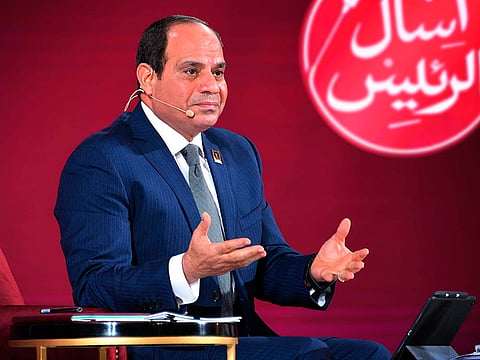Al Sissi defends painful austerity measures
‘I want us to develop acute fear of instability’

Cairo: Egypt’s president zealously defended his economic policies on Sunday, saying he was left with no choice but to embrace painful austerity measures to revive an economy mauled by years of political turmoil and violence.
Abdul Fattah Al Sissi was speaking at a youth conference.
In March, Al Sissi won a second, four-year term after running virtually unopposed.
The economic reform program has won Al Sissi lavish praise from Cairo’s western backers and bankers and showed him as a leader who was prepared to adopt painful measures, like lifting state subsidies on basic items, regardless of the political cost, something his predecessors had not been able to do for fear of unrest or losing power.
Al Sissi has in the past told Egyptians not to listen to anyone but him and repeated that he would only listen to viewpoints different from his if they are based on thorough research. In his latest remarks, he warned that Egypt would not survive another “revolutionary” phase like that of 2011.
“Everything is linked to stability and security. I want us to develop an acute fear of instability,” he said.
Addressing the same youth conference Sunday, Al Sissi warned that economic reform was open-ended and that he intended to continue down the same route. “I will press on because I don’t have another path”.
Al Sissi said Sunday he was prepared to join Egyptian youths and go out to clean the streets. On Saturday, he said he was prepared to eat one meal a day for the rest of his life if that would help Egypt be strong and prosperous.
Seeking to assure Egyptians that his policies would soon bear fruit, he said Egypt will by June 2020 have a surplus of natural gas, complete a network of roads criss-crossing the country, finish the first phase of construction of nearly a dozen new cities and overhaul the railway network.
Along with the economic challenges, Egypt also faces an insurgency by militants in northern Sinai. Al Sissi said Sunday his security forces have made significant progress in the fight against insurgents but warned that future terror attacks could not be ruled out.
Along with battling militants in the peninsula bordering Gaza and Israel, security forces also struggle to secure the porous borders with neighbouring Libya and Sudan, used by militants to smuggle weapons and fighters into Egypt and for cross-border attacks. On Sunday, he said security forces have over the past 18 months intercepted or destroyed some 2,000 vehicles carrying arms, ammunition or militants.



